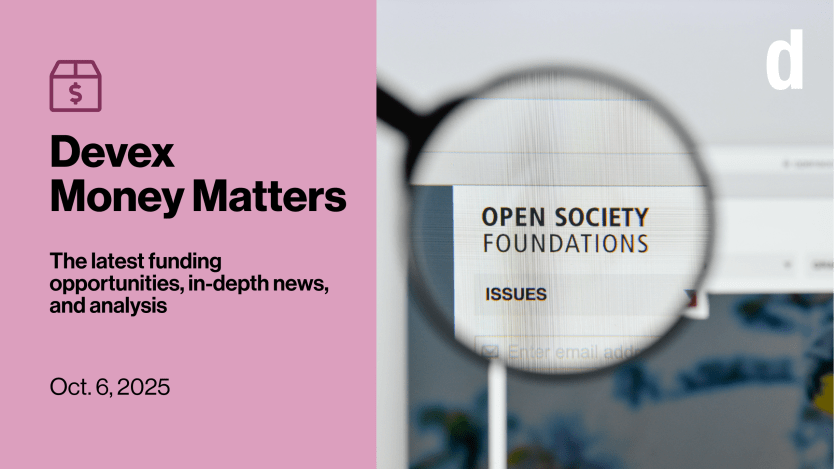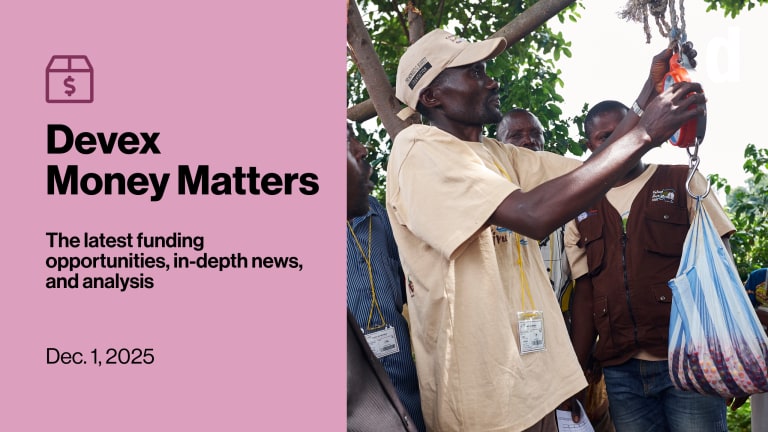
International aid funding has been cut across the board over the last several months, but one source — philanthropy — was widely seen as likely to buck the trend. Now, the same forces that cut the aid budget are moving against some of the more powerful foundations. What will that mean for giving?
Also in today’s edition: A report on U.K. aid’s future from the Labour Party conference.
+ Are there topics you want to read more about in Money Matters? We want your feedback.
Rocky foundations
Philanthropic foundations are one of the few sources of aid funding that have not seen unprecedented difficulties in recent months. But in the United States, at least, they may soon face problems too.
U.S. Justice Department leaders have instructed attorneys to investigate George Soros’ Open Society Foundations, with possible charges ranging from material support for terrorism to racketeering. And other organizations might be in the sights, too.
The White House also produced a new executive memorandum telling law enforcement to “disband and uproot” networks that it views as supporting domestic terrorism — which includes some nonprofits and foundations. The U.S. Treasury and the Internal Revenue Service have been told to crack down on tax-exempt groups that might “directly or indirectly” support political violence.
OSF has pushed back strongly.
“The Open Society Foundations unequivocally condemn terrorism and do not fund terrorism. Our activities are peaceful and lawful, and our grantees are expected to abide by human rights principles and comply with the law,” a spokesperson said in a statement.
Meanwhile, many other foundations have signed their names to a letter defending what Nancy Lindborg of the David and Lucile Packard Foundation calls the freedom to give.
Read: Trump’s scrutiny of nonprofits escalates, with Soros’ OSF at the center
Read: How the Packard Foundation is responding to a new funding environment
Related: How restrictive laws and hostile politics harm global philanthropy
See also: Are donors accidentally funding groups not aligned with their values? (Pro)
+ Happening tomorrow at 9:30 a.m. ET: I’ll be hosting a Devex Pro Funding Briefing with MSD Foundation President Allison Goldberg and Head of MSD for Mothers Jacquelyn Caglia to find out how the global pharma giant — known as Merck & Co in the U.S. and Canada — structures its social impact work and deploys its philanthropic funding. Save your spot now.
Funding activity
We publish tenders, grants, and other funding announcements on our Funding Platform. Here are some of those viewed the most in the past 10 days.
The World Bank has committed $60 million in funding for sustainable urban growth in India.
The Inter-American Development Bank has approved a $177 million loan to improve social reintegration services in Peru’s prison system.
The African Development Bank has signed a €136 million ($159.3 million) loan agreement to support skills and entrepreneurship in Cameroon.
The European Union has announced a call for proposals to provide technical assistance for strengthening cancer screening capacity in Turkey.
The United Nations has launched a call for tech solutions to address climate-related risks and improve the lives of children worldwide.
The Swedish International Development Cooperation Agency is looking for qualified firms to conduct comprehensive research on global best practices to strengthen inclusive finance in Bangladesh.
+ From daily funding opportunity alerts to exclusive intelligence on donor trends, Devex Pro Funding gives development professionals the edge they need to navigate today’s complex finance landscape — and win. Sign up with a five-day free trial now.
Labour pains
What’s next for aid funding in the United Kingdom? There was a chance to read the runes last week when the ruling Labour Party held its annual conference. The conference offers unusually good access to major figures from the government, and Rob Merrick, writing for Devex, was on hand to identify some of the key trends.
It looks as if more cuts are not on the horizon, at least according to the public utterances of those in the know. But any revival in spending seems to rest on persuading the private sector to become more involved — a challenge aid leaders have had limited success meeting so far.
Read: 8 things we learned at the UK Labour Party conference
Natural experiments
My colleague Elissa Miolene attended the Building Bridges conference last week in Geneva, learning all about sustainable finance. There’s a lot more information available in a special edition of our daily Newswire, but I wanted to draw attention to the story I personally found the most interesting — the drive to put nature on the balance sheet.
Right now, we value spending. Gross domestic product growth is seen as king. But we don’t ask how we came by that growth. If you chop down a tree for firewood and sell it, you’ve increased GDP. But obviously, you haven’t got a tree any more, and not to sound like the Lorax or anything, but that’s a downside.
Elissa’s article follows the people trying to make sure that we value our natural resources correctly.
Read: Can nature be placed on the balance sheet?
Read the newsletter: Can finance fix the future? Building Bridges takes a shot
Expanded remit
As official funding falls, it looks as if remittances will continue to grow, even despite new taxes in the United States. One organization pushing the trend is RemitHope, founded by philanthropist Tsitsi Masiyiwa.
Masiyiwa, who co-founded the Higherlife Foundation and Delta Philanthropies, says the initiative reflects a new phase of African philanthropy.
“Now, as the aid from the Global North dwindles, we are stepping up,” she says.
Read: RemitHope looks to diaspora giving to fill Africa’s widening funding gap
+ Interested in more funding coverage? Explore our funding insights page. If you aren’t a Devex Pro member yet, start your 15-day free trial now to access all our exclusive reporting, analyses, events, and more.
Sign up to Money Matters for an inside look at the biggest stories in development funding.








